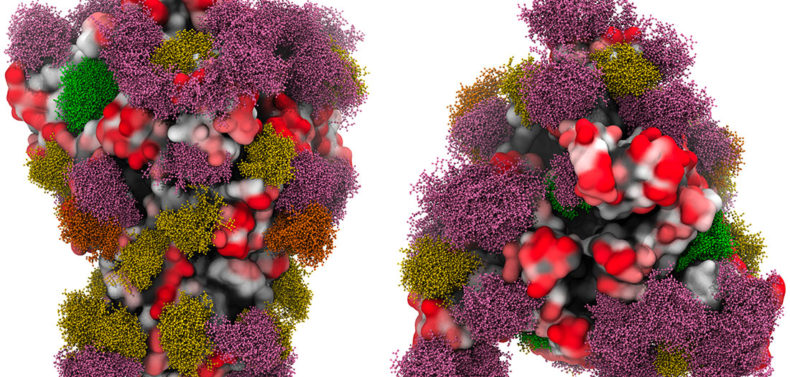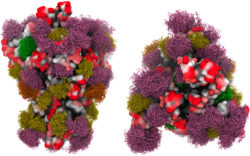If you were hoping to find glowing, optistmic news about the future of the pandemic, unfortunately, we’re just not there yet. While there are potential positive developments, the evidence suggests people need to follow public health recommendations—hand washing, social distancing and mask wearing—for several more months.
St. Mary’s emergency room doctor Brandon Hicks told Flagpole that while the vaccines are encouraging, they won’t end the pandemic alone. “Mask wearing and social distancing still need to be our No. 1 priority,” he said.
While state Department of Public Health data shows that cases and hospitalizations are currently trending downward, public health experts are not sure whether this is an actual reprieve or merely temporary. The seven-day average of new cases in Athens-Clarke County has been dropping since mid-January, from over 100 to 69 on Jan. 30.
“Despite the apparent slowdown, case rates and hospitalizations in our service area remain high,” said St. Mary’s Chief Medical Officer Jason Smith. “We have a long way to go before we are out of the woods… We need to come together now to ensure a new surge doesn’t happen on top of the present high plateau. We urge everyone to embrace President Biden’s 100-day mask challenge and to keep maintaining social distance, avoiding gatherings, washing hands and staying home if sick except to seek medical care. We especially urge everyone to get vaccinated when your priority tier opens up.”
As of Feb. 2, there have been 11,194 confirmed cases and another 1,943 positive rapid antigen tests, for a total of 13,137 cases in Clarke County. While hospitalizations have declined, they remain high and are stressing the health-care system. As of Feb. 2, 75 ICU beds were in use, five above normal capacity. The percentage of COVID-19 patients in local hospitals has decreased to 30% of all hospitalized patients.
“Doctors and nurses report to me very high levels of physical and emotional exhaustion, given the continued stress of long shifts, opening [of] extra treatment wards and [the] experience [of] supporting dying patients,” Mayor Kelly Girtz said.
“Our critical care capacity has been tested frequently since the post-Thanksgiving surge began,” Smith said. “We consistently operate near or at capacity and often have to hold some critical care admissions in our [ER] for a few hours until beds open up on the unit. We continue to work with our medical staff to expedite transfers from critical care to step-down units when medically appropriate. To date, we have not had to expand our critical care capacity. We monitor the situation constantly and have surge plans in place should they be needed.”
Piedmont Athens Regional has converted some surgery recovery beds to critical care, CEO Michael Burnett told WXAG 1480 AM radio host Gwen O’Looney last week. The hospital did not respond to Flagpole’s requests for comment.
Wastewater collected twice a week by Erin Lipp at the UGA Center for the Ecology of Infectious Diseases often catches trends before they show up in testing. Last week her lab’s report said that the “average viral load for the week decreased from the previous week but was still higher than 70% of all samples collected to date… Viral load and transmission remain high in Athens-Clarke County.”
UGA’s self-reported Dawgcheck data, released each Wednesday, showed 190 cases of COVID-19 among students, faculty and staff for the week of Jan. 20–26 and a positive rate of 2.49% for surveillance testing. However, UGA’s lack of transparency inspires little confidence in the validity of the data. UGA has not yet provided any answers to repeated inquiries about the usage rate of the Dawgcheck app.
On the vaccination front, Athens continues to grapple with availability of the vaccine. While this stands to improve as federal policy changes, there are now 31 providers in Clarke County, up from 23 providers two weeks ago, whenever more shots are available.
“I am glad that Biden is willing to invoke the Defense Production Act to assist in supplying vaccines, and coming approvals for the Johnson & Johnson and A-Z vaccines will help,” Girtz said. “However, there are sheer physical realities of production and supply-chain management that have to be handled, for both the vaccine itself as well as storage containers, glassware and related items. On top of that is the data management and electronic vaccination portal rollout that has hampered public health here in Georgia in these recent weeks of vaccination. This is another signal that public health needs more funding and staffing in ‘good times’ to ensure that we are preventing the underlying health conditions that make this virus particularly deadly to people of color and poor communities, and that we are prepared for emerging or unforeseen health crises.”
The Northeast Health District sent out emails to anyone who pre-registered for the vaccine this week. “[That] message was sent to those who have pre-registered with us,” said NE Health District Covid-19 PIO Sarah Peck. “We will be sending similar communications regularly to keep individuals on the waitlist informed of any updates related to COVID-19 vaccine availability and allow them to update their contact information or indicate they no longer require an appointment. The message also serves as confirmation that they remain on the waiting list.”
While there’s been much confusion and a lack of clear communication to the public about details of vaccination efforts, a new statewide online scheduling tool for health districts should provide some relief to overwhelmed phone banks eventually. DPH spokesperson Nancy Nydam told Flagpole via email that they were aiming for mid-February to have that tool available statewide.
As of Jan. 29, the Northeast Health District had administered over 10,000 COVID-19 vaccines. This does not include vaccines administered by other providers, said Peck.
Additionally, according to a campus-wide email that showed the results of a UGA community survey about vaccinations, 77% of respondents wanted the vaccine from the university. To date, UGA has administered 1,500 first doses to those who qualify under CDC guidelines. That includes faculty and staff over the age of 65, who are a part of Tier 1A+.
Like what you just read? Support Flagpole by making a donation today. Every dollar you give helps fund our ongoing mission to provide Athens with quality, independent journalism.










